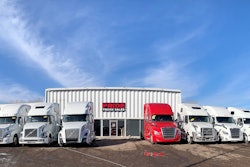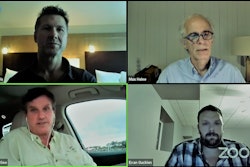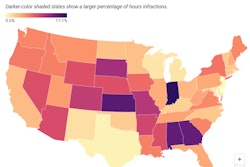Former Landstar-leased owner-operator Gary Buchs recalled making a final delivery to a long-time customer and telling his contact that he was retiring. After offering congratulations, the contact retrieved from a Rolodex a business card Buchs had left when he made his first delivery some years prior, noting that Buchs had been called three or four times simply because he had left his card and made a good impression.
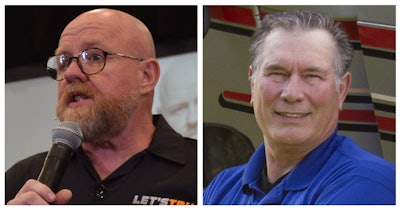 Owner-operator coaches Kevin Rutherford, left, and Gary Buchs answered questions about best practices in Overdrive‘s Partners in Business webinar.
Owner-operator coaches Kevin Rutherford, left, and Gary Buchs answered questions about best practices in Overdrive‘s Partners in Business webinar.“That’s how you compete with cheap carriers: Get as close to the final customer as possible,” Buchs said Tuesday evening during an Overdrive’s Partners in Business webinar. “You don’t drive miles. You haul value for profit.”
Building relationships to stand apart from cut-rate competitors was one of the topics covered by Buchs and trucking radio personality Kevin Rutherford during the session streamed live on Overdrive’s Facebook page. It was part of Overdrive’s GATS Week, a series of evening presentations that began Monday and concludes Friday.
The two owner-operator coaches also fielded questions about cost-cutting, knowing your key operational numbers, buying new versus used and avoiding irrational decision-making.
Rutherford recalled a caller to his show who wanted to become an owner-operator. “He bought a $3,000 truck at auction,” he said. “He put about $5,000 into making it safe and legal.” The operator grossed more than $240,000 in his first year and decided to keep the truck, showing what’s possible with careful attention to truck choice and sound practices.
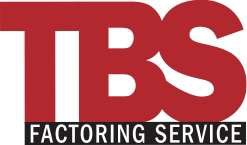 Overdrive‘s Partners in Business program is sponsored by TBS Factoring Service.
Overdrive‘s Partners in Business program is sponsored by TBS Factoring Service.The low entry price and avoidance of a large fixed cost – a monthly truck payment – is a big reason why buying used often makes sense, especially for someone new to the owner-operator world, said Rutherford, a former small-fleet owner. “I consider new trucks risky – really risky. It’s surprising to me how many people believe the opposite.”

Some defend buying new by pointing to the warranty, but even with a warranty, a repair could mean a week or more of downtime with no revenue, he said.
Truck selection is one of many key decisions best evaluated when the operator knows his business numbers well, such as cost per mile, gross revenue and net income. Such primary data can be found on a simple profit and loss statement, Rutherford said.
SiriusXM’s Road Dog channel will offer more virtual GATS programming Thursday and Friday, and is offering a free, three-month subscription to SiriusXM.
With that information, Buchs said, an operator can do mid-range planning that will guide many decisions. For example, out of the 122 days between Sept. 1 and Dec. 31, how many do you plan to work? To get the net income you need, based on your fixed costs and variable costs, such as fuel, how much revenue will you need to average per day? “That can keep you from running loads that are a break-even or a loss.”
Rutherford says his radio show gets frequent questions about buying a truck or changing carriers. That often leads to questions about the caller’s business metrics, which the caller often says he can’t recall, but they’re on his computer. “If you have one truck and can’t tell me right off your head, you don’t know them,” he said.
Familiarity with that data is critical in times like these. Many independents shut down for weeks this spring as rates plunged and even upswings are dubious in light of uncertainties such as the pandemic and the presidential election. Rutherford advised not looking to new ventures for now.
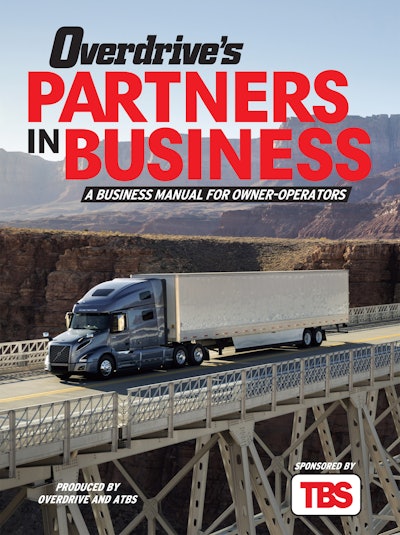 Download a free copy of the newly updated 2021 Partners in Business manual.
Download a free copy of the newly updated 2021 Partners in Business manual.“You’ve got to protect that downside,” he said. Examine your profit and loss statement, and “start cutting everything that isn’t necessary to run the business right now.”
Both speakers encouraged simplicity in all aspects of record-keeping because it’s human nature to avoid any system that’s too detailed or too complex to operate. For maintenance tracking, Buchs recommended keeping repairs separate from routine variable costs, such as preventive maintenance items like oil changes, and tires. Rutherford noted that if you find yourself tediously tracking specific expenditures, ask yourself if you would ever use the information to make a decision. If not, don’t bother.
Rutherford’s ProfitGauges accounting product is “so simple a one-truck owner-operator can do a month of bookkeeping in 30 minutes,” he said, and with diligent operation it can help open the window on valuable fixed and variable costs.
For an operator with high fixed costs, “You better get your ass out there and work,” he said. “You have a big nut to crack just to break even. If you have low fixed costs, you can stay home more often.”
Buchs stressed not only such hard data, but after studying “behavioral economic psychology,” he’s recognized softer factors that often mislead owner-ops. “Truck drivers can be very irrational,” he said. “We let our emotions get in the way of making a decision.”
For example, owner-ops often focus on gross revenue, but “it doesn’t mean anything,” he said. Instead, “It’s your profit” that owner-operators should be most closely attuned to. After all, it’s common for a large business to gross millions of dollars, yet lose money.
Some operators defend their financial decisions, such as discretionary purchases, as helping to defray taxes, and even chide other operators who end up with a tax bill, telling them they need a new accountant. Yet it’s irrational to make tax avoidance a primary goal for an independent contractor because a high tax bill generally reflects strong net income, said the speakers. As Rutherford noted, if you’re consistently paying no taxes, it means either you’re cheating or you earned no income.
If you missed it, you can sit in on the full session via the video below.
Your most pressing owner-op business question?
Trucking business expert Kevin Rutherford and owner-operator coach Gary Buchs answer your questions in this best practices discussion. #GATSWeek
Posted by Overdrive Magazine on Tuesday, August 25, 2020


